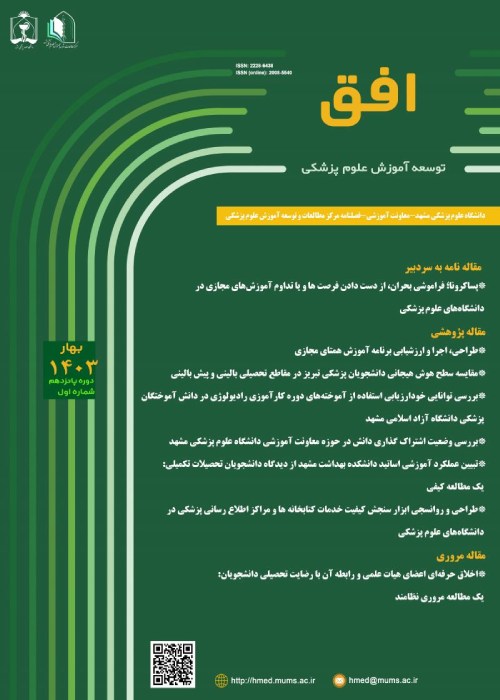Design, Implementation, and Evaluation of a Virtual Peer Education Program
One of the active methods of teaching is peer education. Considering that one of the expected abilities of master's degree students in health education is teaching, this study was conducted with the aim of designing, implementing, and evaluating a virtual peer education program for students.
This study was carried out in 2021-2022 in two academic years at the Faculty of Health, Arak University of Medical Sciences, for master's students in education and health promotion in the course "Educational Technologies" based on the ADDIE educational design model. The steps of this model include analysis, design, development, implementation, and evaluation, all of which were done by the student under the supervision of the teacher. Eight virtual contents were provided by students as peer education for other students. Each content was between 30 and 45 minutes, which was compiled based on the lesson plan and educational goals. In this process, input, process, and outcome were evaluated. Four levels of Kirkpatrick's model were used to evaluate the outcome.
Eight students participated in this study. In the first level of Kirkpatrick (students' reaction), the average score was 18.17 ± 0.54. In the second level of learning, the average pre-test score was 12.5 ± 3.5 and the average final exam score was 17.95 ± 1.02. In the third level or skills, the average score for how to conduct needs assessment was 18.5 ± 0.73, from the educational design, was 18.8 ± 0.51, from the of preparation and implementation of educational content and virtual teaching was 17.75 ± 0.92 and in the fourth level of Kirkpatrick, the average skills score in virtual education to people were 18.25 ± 1.50.
Virtual peer education is an effective way to improve the knowledge and skills of and in the digital age, it can be used alongside face-to-face training. This study helped to improve the virtual teaching skills in students of health education and promotion.
- حق عضویت دریافتی صرف حمایت از نشریات عضو و نگهداری، تکمیل و توسعه مگیران میشود.
- پرداخت حق اشتراک و دانلود مقالات اجازه بازنشر آن در سایر رسانههای چاپی و دیجیتال را به کاربر نمیدهد.


